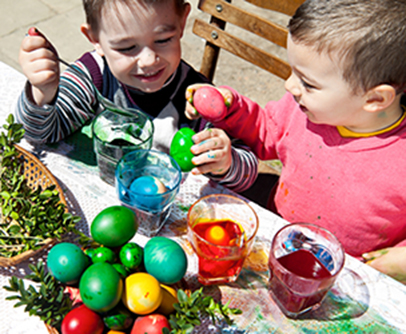Easter Sunday  is coming right up, so here are some important food-safety tips to remember this time of year when you’re decorating, cooking and/or hiding Easter eggs:
is coming right up, so here are some important food-safety tips to remember this time of year when you’re decorating, cooking and/or hiding Easter eggs:
Be sure and inspect the eggs before purchasing them, making sure they are not dirty or cracked. Dangerous bacteria may enter a cracked egg.
Store eggs in their original cartons in the refrigerator rather than in the refrigerator door.
Wash your hands thoroughly with hot soapy water and rinse them before handling the eggs when cooking, cooling, dyeing and hiding them. Also thoroughly wash utensils, counter tops and anything else the eggs will come into contact with.
It’s a good idea to use one set of eggs for dyeing, decorating and hunting and a second set for eating. Or, you can use colorful plastic Easter eggs with treats or toys inside for your Easter egg hunt.
If you’re planning to eat the Easter eggs you dye, be sure to use food-grade dyes only. You can even make your own egg dyes from common and easily available foods.
If you’re having an Easter egg hunt, consider your hiding places carefully. Avoid areas where the eggs might come into contact with pets, wild animals, birds, reptiles, insects or lawn chemicals.
Make sure you find all the eggs you’ve hidden and then refrigerate them within two hours. Discard any cracked eggs.
As long as the eggs are NOT out of refrigeration for more than two hours, they will be safe to eat. Do not eat eggs that have been out of refrigeration for more than two hours. Refrigerate hard-cooked eggs in their shells and use them within one week.
Refrigerators should always keep foods at 40 degrees F or colder. If you’re not sure about yours, check the temperature with an appliance thermometer.
If you are planning to use colored eggs as decorations (for centerpieces, etc.) and the eggs will be out of refrigeration for many hours or several days, discard them after they have served their decorative purpose.
If you will be painting and decorating hollowed-out eggshells, use pasteurized shell eggs so you don’t expose yourself to Salmonella from the raw egg while blowing it through holes poked in the shell. To sanitize the outside of the egg, wash it in hot water and rinse it in 1 teaspoon chlorine bleach per half-cup of water.
Observing these food-safety tips will make it a fun and healthy Easter for you and your family.





